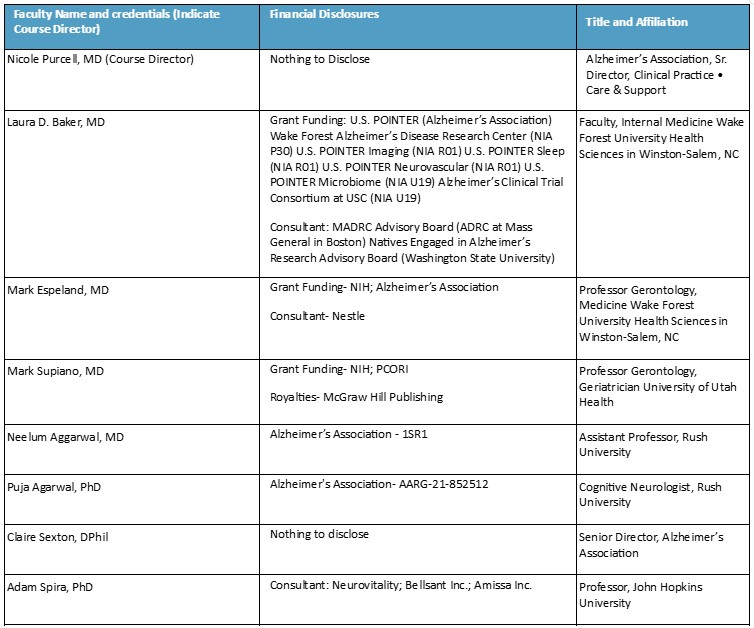Modifiable Risk Factors for Dementia Microlearning Series - (CME, CNE, Pharmacy CEUs, IPCE)
The Public Health Center of Excellence on Dementia Risk Reduction is made possible by the Centers for Disease Control and Prevention of the U.S. Department of Health and Human Services as part of a financial assistance award totaling $3,707,435 with 100% funded by CDC/HHS. The contents of this microlearning are those of the Alzheimer’s Association and do not necessarily represent the official views of, nor an endorsement by, CDC/HHS or the U.S. Government.
Education Activity Description: This eight-part microlearning video series will address the topic of modifiable risk factors; lifestyle and behaviors that can reduce or increase a person’s chances of developing dementia. This series will outline evidence-based risk reduction interventions for dementia focused on: (1) Physical Activity (2) Diabetes and Obesity (3) Vascular Risks (4) Tobacco Use (5) Traumatic Brain Injury (6) Diet and Nutrition (7) Cognitive Engagement and (8) Sleep.
Jointly provided by Postgraduate Institute for Medicine and Alzheimer’s Association
Estimated time to complete activity: 15 minutes [.25] credit hours per module (8 modules)
Learning Objectives:
Module 1 Physical Activity
Identify the effects of exercise on the body.
Recognize the effects of exercise on the brain.
Discuss the evidence for the effects of exercise on cognition.
Describe the importance of collaboration across professions to address dementia-related challenges in primary care.
Module 2 Diabetes and Obesity
Recognize the association of diabetes and obesity on the risk of cognitive decline.
Evaluate strategies for prevention of diabetes and obesity.
Summarize the effect of diabetes and obesity treatment on cognition.
Describe the importance of collaboration across professions to address dementia-related challenges in primary care.
Module 3 Vascular Risk
Describe the association of vascular risks and cognitive impairment.
Summarize the strategies for vascular risk factor prevention.
Recognize the treatment strategies to reduce vascular risks.
Describe the importance of collaboration across professions to address dementia-related challenges in primary care.
Module 4 Tobacco Use
Identify the association between tobacco use and cognition.
Describe the importance of collaboration across professions to address dementia-related challenges in primary care.
Module 5 Traumatic Brain Injury
Describe the association between traumatic brain injury and cognitive decline and dementia.
Identify the different causes of traumatic brain injury.
Summarize actions to take to reduce the risk of traumatic brain injury across the life course.
Describe the importance of collaboration across professions to address dementia-related challenges in primary care.
Module 6 Diet and Nutrition
Describe the association between diet and cognitive decline and dementia.
Identify the types of diets and nutrients that may promote brain health.
Summarize the evidence for the effects of diet and nutrition on brain health.
Describe the importance of collaboration across professions to address dementia-related challenges in primary care.
Module 7 Cognitive Engagement
Describe the association between cognitive engagement and cognitive decline and dementia.
Identify groups that may be most at risk for lower levels of cognitive engagement.
Describe the importance of collaboration across professions to address dementia-related challenges in primary care.
Module 8 Sleep
Describe the association between sleep and cognitive decline and dementia.
Describe how poor sleep may affect the brain.
Summarize the public health actions that can be taken to improve sleep quality across the life course.
Describe the importance of collaboration across professions to address dementia-related challenges in primary care.
Faculty

Accreditation Information:
Disclosure of Unlabeled Use: This educational activity may contain discussion of published and/or investigational uses of agents that are not indicated by the FDA. The planners of this activity do not recommend the use of any agent outside of the labeled indications. The opinions expressed in the educational activity are those of the faculty and do not necessarily represent the views of the planners. Please refer to the official prescribing information for each product for discussion of approved indications, contraindications, and warnings.
Disclaimer: Participants have an implied responsibility to use the newly acquired information to enhance patient outcomes and their own professional development. The information presented in this activity is not meant to serve as a guideline for patient management. Any procedures, medications, or other courses of diagnosis or treatment discussed or suggested in this activity should not be used by clinicians without evaluation of their patient's conditions and possible contraindications and/or dangers in use, review of any applicable manufacturer's product information, and comparison with recommendations of other authorities.
Target Audience: Primary care clinicians, including internists, family physicians, radiologists, neurologists, nurse practitioners and physician assistants, nurses, and pharmacists who are seeking additional education in the assessment, diagnosis and ongoing health care of patients with cognitive impairment and dementia.
Statement of Purpose: A practice gap is the difference between what healthcare professionals should or could be doing and what they are currently doing. Using current evidence based to bridge the gap between patient care and care recommendation, ensuring healthcare professionals are not only aware of current practice but are utilizing them in patient care settings. This will be accomplished by increasing awareness and knowledge of new guidelines on the impact that physical activity, diabetes and obesity, vascular risk, tobacco use, traumatic brain injury, diet and nutrition, cognitive engagement, and sleep can have on brain health/cognition.
 Joint Accreditation Statement
Joint Accreditation Statement
In support of improving patient care, this activity has been planned and implemented by the Postgraduate Institute for Medicine and Alzheimer's Association. Postgraduate Institute for Medicine is jointly accredited by the Accreditation Council for Continuing Medical Education (ACCME), the Accreditation Council for Pharmacy Education (ACPE), and the American Nurses Credentialing Center (ANCC), to provide continuing education for the healthcare team.
Credit Designations:
Physician Continuing Medical Education; The Postgraduate Institute for Medicine designates this enduring material for a maximum of .25 AMA PRA Category 1 Credit(s)™ per module. Physicians should claim only the credit commensurate with the extent of their participation in the activity.
Continuing Nursing Education: The maximum number of hours awarded for this Continuing Nursing Education activity is .25 contact hours. This activity is being presented without bias and without commercial support.
Continuing Pharmacy Education: Postgraduate Institute for Medicine designates this continuing education activity for .25 contact hour(s) (0.025 CEUs) of the Accreditation Council for Pharmacy Education.
Universal Activity Number -
18202 - Modifiable Risk Factor for Brain Health: Diabetes and Obesity
18203 - Modifiable Risk Factor for Brain Health: Vascular Risks
18204 - Modifiable Risk Factor for Brain Health: Tobacco Use
Modifiable Risk Factor for Brain Health: Traumatic Brain Injury
JA4008162-9999-25-069-H01-P
Modifiable Risk Factor for Brain Health: Diet and Nutrition
JA4008162-9999-25-070-H01-P
Modifiable Risk Factor for Brain Health: Cognitive Engagement
JA4008162-9999-25-071-H01-P
Modifiable Risk Factor for Brain Health: Sleep
JA4008162-9999-25-079-H01-P
Type of Activity: Application
Interprofessional Continuing Education:
This activity was planned by and for the healthcare team, and learners will receive .25 Interprofessional Continuing Education (IPCE) credit for learning and change.
Disclosure of Financial Relationships:
Postgraduate Institute for Medicine (PIM) requires faculty, planners, and others in control of educational content to disclose all their financial relationships with ineligible companies. All identified conflicts of interest (COI) are thoroughly mitigated according to PIM policy. PIM is committed to providing its learners with high quality accredited continuing education activities and related materials that promote improvements or quality in healthcare and not a specific proprietary business interest of an ineligible company.
Planners and Managers: The PIM planners and managers have nothing to disclose. The Alzheimer’s Association planners and managers have nothing to disclose.
Faculty Disclosures:


